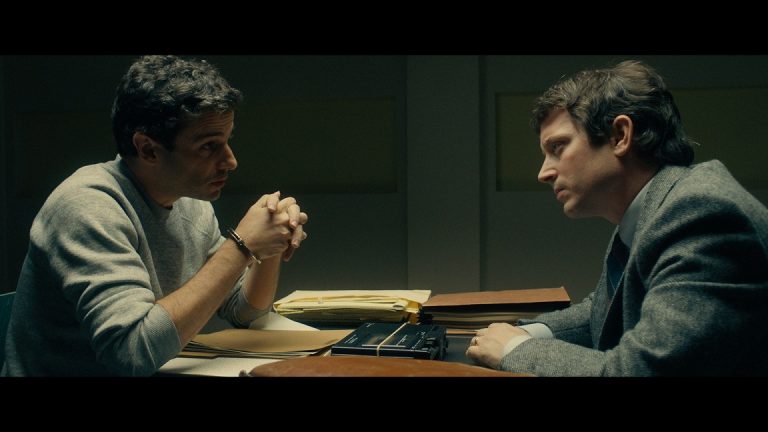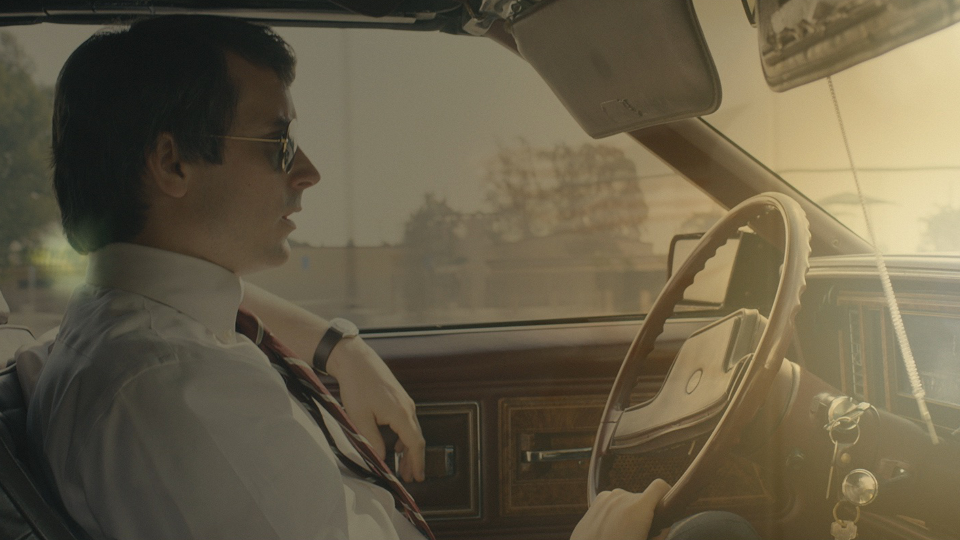
There are certain names that are well-known enough that they need little context to be understood and referenced in any conversation.
Ted Bundy is one such figure, a notorious serial killer whose legacy has endured in the thirty or so years since he was executed for his crimes. But, unlike many murderers eager to be given the proper credit for their malevolent and meticulous crimes, Bundy was reticent to confess, only offering up any admission of guilt as his execution was fast approaching. No Man of God explores the run-up to that time and chips away at the mysterious exterior of an infamous celebrity.
Bundy (Luke Kirby) is introduced when he is already in custody and has been sentenced to death. He has been generally unwilling to talk to law enforcement, but there’s something about FBI analyst Bill Hagmaier (Elijah Wood) that makes him ready to open up. It’s the small things, like Hagmaier’s compliance in bringing him a requested pack of contraband gum, that make Bundy feel like Hagmaier doesn’t pose a threat, incapable of doing something to make Bundy’s incarceration any worse.

This isn’t the first film or TV show about profiling serial killers, nor is it the first project in recent memory about Bundy. Netflix’s Mindhunter offers a dark trip into the minds of those compelled to murder and other gruesome acts, and highlights the eagerness of those who have been caught to earn eternal glory for that which they have done. Though that show takes place about a decade before the events of this film, the concept is similar, and those who liked that series should find this approach fulfilling.
This version of Bundy’s story is certainly different from Extremely Wicked, Shockingly Evil and Vile, in which Zac Efron played an affable, camera-baiting Bundy who represented himself in court with a smile on his face. Kirby’s interpretation is much more restrained, offering up only hints of who he is and keeping his audience, both Hagmaier and those watching the film, at arm’s length, only revealing what he wants to through measured enthusiasm and minimal details. It’s reminiscent at times of Kirby’s Emmy-winning turn as another real person, Lenny Bruce, on The Marvelous Mrs. Maisel, though what he was eager to say to an adoring crowd was far less toxic and violent that all that Bundy did.

As much as this film is about Bundy, it’s just as much about an effort to gain insight into the minds of serial killers. Wood portrays Hagmaier as relatively low-energy and likeable, soaking up everything Bundy says in the hope that he will say too much and reveal what he holds so closely guarded. Most of the film remains focused on their two-person interactions, though there are scenes in which Hagmaier meets with his FBI colleagues and odd, disturbing montages combining shots of families and sexual violence that serve as a reminder that, despite Bundy’s accessible demeanor, he has in fact been convicted of heinous and brutal crimes.
The conversations featured in this film and found in Kit Lesser’s script are based on real-life transcripts, which means that they aren’t always riveting but do tend to be engrossing, drawing Hagmaier and those watching their screens into whatever long tale Bundy is spinning. What may be most fearsome about him is that he doesn’t seem like he’s lying through his teeth, perhaps unable to see the wrong in what he has done and to acknowledge that, especially with his pre-arranged death coming up, he has the opportunity to provide closure for the families whose loved ones he has killed.
In that sense, this is by no means a definitive biography of Bundy or a test case that speaks for the success of the FBI profiling program that has its origins in the content reenacted here.
It also doesn’t offer absolution to Bundy for what he did and his reticence to share it. It does, however, give audiences a window into how Bundy spent his last days in confinement and the relationship he built with Hagmaier, and that experience is made poignant and involving by a controlled focus on their dynamic and supported by strong visual elements and cinematography.
Grade: B
No Man of God is screening in the Spotlight Narrative section of the Tribeca Film Festival and will be released in theaters, on demand, and on digital on August 27th.

